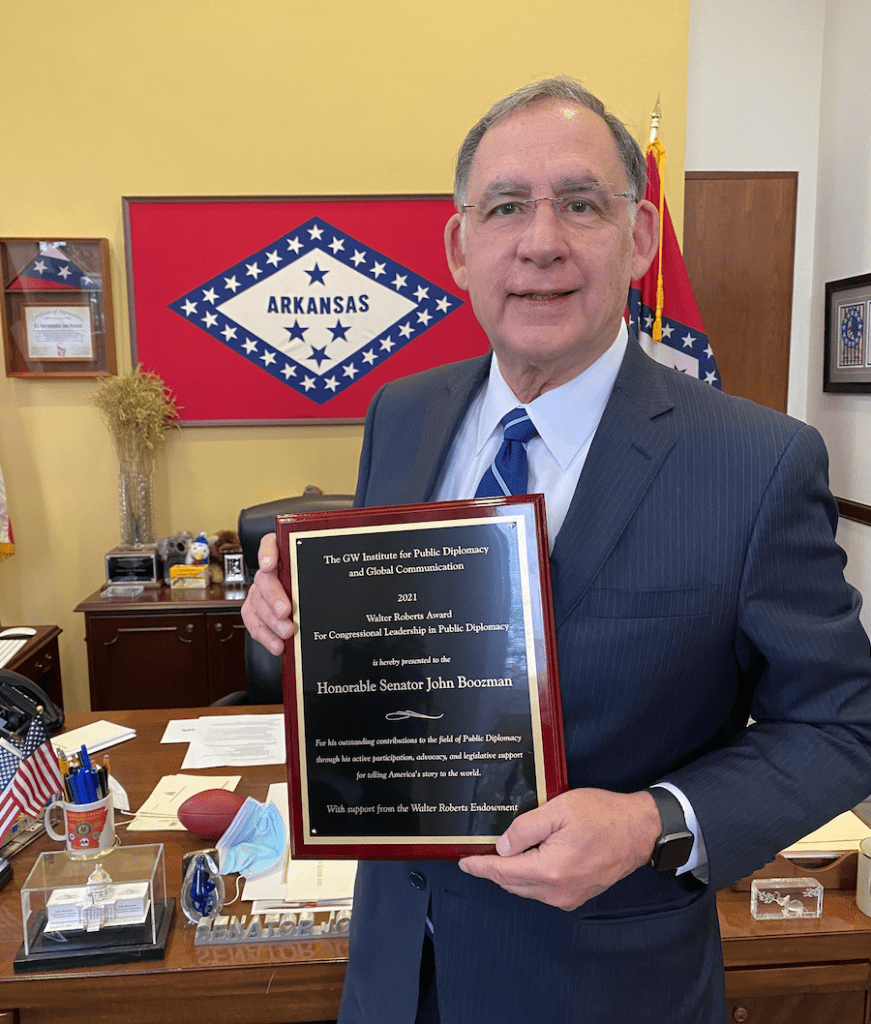Improving US intercultural relations, communications, and understanding through exchange
By Gabriella Armonda, BA Political Communications, May 2021.

On January 27, 2021, the GW Institute for Public Diplomacy and Global Communication presented Senator John Boozman, (R-Ark.) with the 2021 Walter Roberts Award for Congressional Leadership in Public Diplomacy.
At the sme time, the Walter Roberts Endowment awarded a $5,000 grant to Global Ties Arkansas for a micro-project focused on supporting alumni exchanges; the grant supports the continued growth for Public Diplomacy programs. I helped put together the virtual webinar for the award ceremony.

This award was in recognition of Sen. Boozman’s ongoing support of the Fulbright program and other educational exchanges. Historically, educational exchanges have been a strategic tool in public diplomacy, and a prime component of America’s “soft power.” Soft power, first defined by Joseph Nye, is the ability to influence the behaviors of those in other countries to produce desired results. Unlike other forms of international diplomacy, soft power bypasses the use of coercion and force. Much of soft power rests on constructive educational exchanges. In fact, the sponsorship of programs like the Fulbright program has allowed America to improve intercultural relations, communications, and understanding between itself and other countries. The Fulbright program awards highly competitive scholarships to U.S. students, foreign students, teachers, and scholars to study, research, teach, or use their skills abroad. This program is one way that the U.S. can build understanding and partnerships and help us to exercise our soft power.

For many practitioners of public diplomacy, the Fulbright Program serves as a beacon of hope for America’s future by improving our relationships with our allies and adversaries. History has shown that these educational exchanges, without a doubt, have strengthened national relationships, made lasting connections, and produced a positive impact on U.S. relations with the outside world. In other words, educational exchanges help diplomacy occur more efficiently at all levels of foreign affairs by facilitating understanding and communication.
One of the most important aspects of educational exchanges is the personal relationships that form from a continued dialogue between Americans and foreigners. Without funding from Congress’s annual appropriations bill, the United States would not be able to project and spread its image, ideals, or beliefs. Educational exchanges are one of the most important avenues for ensuring that American culture and society are experienced first-hand, and we hope, are appreciated and more respected. Educational exchanges build allies and leave adversaries with fewer incentives to work against the United States on foreign diplomacy issues. Public diplomacy is not constrained to a singular form. Instead, it has various shapes and fashions from the arts, drama, and sports to science, math, and languages. Ultimately, without support from U.S. senators like Sen. Boozman, who prioritized the expansion of educational exchanges, American diplomacy would struggle and we would waste an excellent source of our soft power. The world is influenced through coercion but also soft power, which is why funding programs that focus on educational exchanges is essential to the continued strength of American democracy.
Gabriella Armonda is a student in the SMPA 3350 Public Diplomacy class taught by Public Diplomacy Fellow Emilia A. Puma. She is a senior in the School of Media and Public Affairs majoring in Political Communications with a minor in Spanish.
The opinions expressed in this blog are those of the author. They do not express the views of the Institute for Public Diplomacy and Global Communication or the George Washington University.

